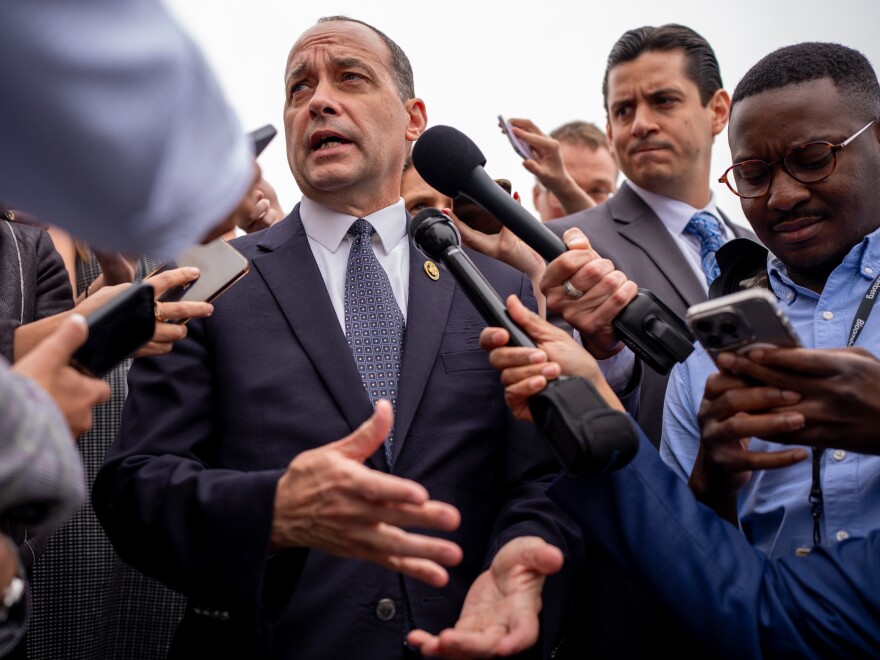Updated April 20, 2024 at 3:18 PM ET
The House of Representatives has voted to pass a $95 billion foreign aid package that includes funding to Ukraine, Israel and Taiwan.
Each portion of the package — which was broken down into separate bills — received bipartisan support. A majority of Republican members — 112 — voted against aid to Ukraine, with one member voting "present." Thirty-seven Democrats voted against aid to Israel.
The package contains a fourth bill aimed at implementing sanctions and policies to counter China, Iran and Russia. It also includes a version of a House bill that passed overwhelmingly in March that forces TikTok to divest from its Chinese parent company or face a ban in the U.S.
In a statement Saturday, President Biden thanked lawmakers for coming together to pass the funding for U.S. allies that he has been pushing for months.
"It comes at a moment of grave urgency, with Israel facing unprecedented attacks from Iran, and Ukraine under continued bombardment from Russia," Biden said. The president urged the Senate to quickly send it to his desk for signature.
How the funding finally passed
The House-passed bills are similar to a $95 billion package that passed the Senate in February but then stalled in the House.
The White House and congressional Democrats had urged Speaker Mike Johnson to hold a vote on that Senate package in the wake of Iran's recent unprecedented attack on Israel, and amid briefings that Ukraine is in dire need of U.S. aid.
But aid for Ukraine remains deeply unpopular with large portions of Johnson's conference, who argue the House shouldn't provide further funding without strengthening security at the U.S.-Mexico border.
Johnson announced earlier this week that he would break up foreign aid into distinct bills so his members could vote their conscience on each piece.
"Our process, in the end, ensured that each member was able to consider the individual supplemental elements on their own merits, which is exactly how the House is supposed to work," Johnson said after the vote on Saturday afternoon. "I know there are critics of the legislation. I understand that — it is not a perfect piece of legislation. We're not ensured that in a time of divided government."
Ahead of the vote, Rep. Michael McCaul, who chairs the Foreign Affairs Committee, said, "History will judge us by our actions here today."
"The world is watching. Our adversaries are watching," the Texas Republican said.
Take a closer look at what's inside the House foreign aid package.

Eyes on potential motion to vacate vote
There was speculation that Georgia Rep. Marjorie Taylor Greene would trigger a motion to vacate the speaker after Saturday's vote. Greene first filed the motion to vacate resolution a month ago, in part over frustration with the speaker on how he handled a $1.2 trillion spending package.
On Friday, a third Republican member signed onto the effort to remove Johnson as speaker.
And now there are three.
— Rep. Marjorie Taylor Greene🇺🇸 (@RepMTG) April 19, 2024
Thank you to @RepGosar for cosponsoring my motion to vacate Speaker Johnson! pic.twitter.com/ODzoKVeCdA
But Greene told reporters after the Saturday vote she wants "to let my colleagues go home and hear from their constituents."
"I've said from the beginning I'm going to be responsible with this," Greene said. "I'm handling this the right way. I'm allowing the process to happen."
She called Johnson a lame-duck speaker.
"If we had the vote today in our conference, he would not be speaker."
House Freedom Caucus chair Bob Good, R-Va., told reporters on Friday that although he doesn't defend Johnson's performance as speaker, he thinks it's not in the interest of the Republican Party to go through another speakership fight six months before an election.
"I hope they will not move forward with that," he said of the GOP trio that is sponsoring the motion to vacate resolution. "I think we ought to have a contest in November, a deliberative process to select, hopefully, the speaker of the House majority. But I don't think it'd be a wise course of action to do that now."
Copyright 2024 NPR. To see more, visit https://www.npr.org.




